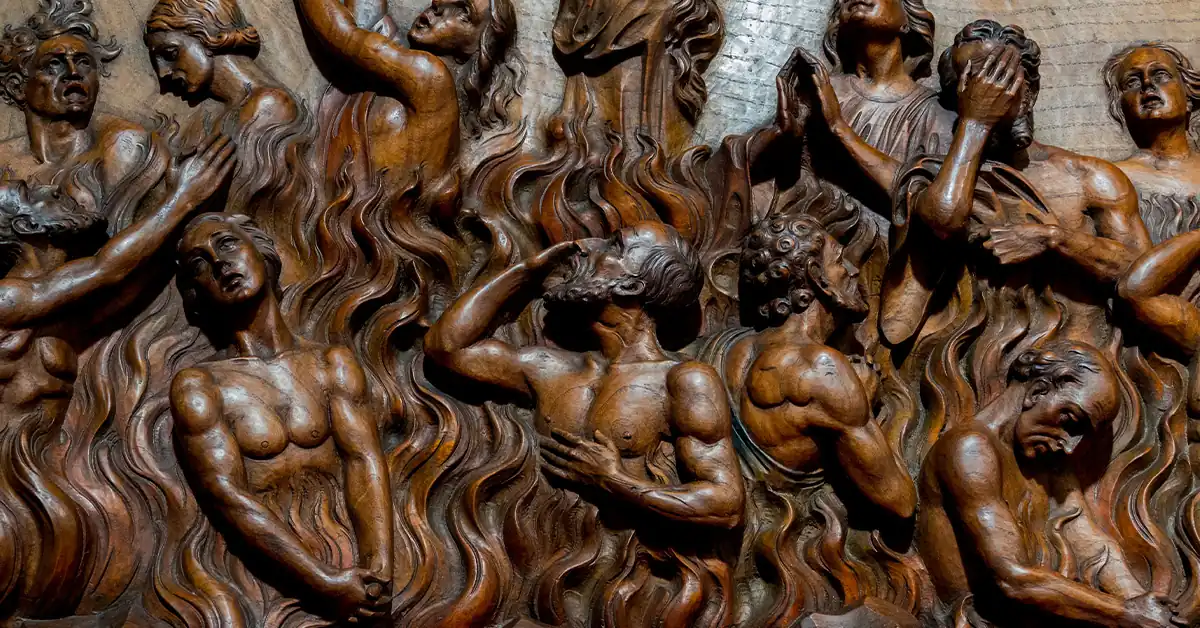
Does the Bible Teach Purgatory?
When most people hear the word Purgatory, they think of the Roman Catholic teaching: a place where souls who died in God’s grace but not fully purified undergo cleansing by fire until they are ready for Heaven. But is this really what the Bible teaches? And how does this connect with the bigger picture of God’s justice and mercy?
The truth is, the Bible does not teach Catholic Purgatory. Yet, it does teach something far richer , a process of purification and restoration within God’s unfolding ages. Understanding this helps us dismantle the false systems of Eternal Conscious Torment and Annihilationism and recover the biblical vision of Universal Reconciliation.
The Catholic Case for Purgatory
Catholic theologians often appeal to three key passages of Scripture:
1 Corinthians 3:13–15
Paul says that a believer’s works will be tested by fire. Some works will remain, others will burn. And even if all a man’s works are lost, “he himself will be saved, but only as through fire.” Catholics argue this fire represents a post-death purgation , not Hellfire, but a temporary refining flame.
Matthew 12:32
Jesus says blasphemy against the Holy Spirit will not be forgiven “either in this age or in the age to come.” Catholics see this as implying that other sins can be forgiven in the next age, therefore supporting the notion of Purgatory.
2 Maccabees 12:45
This passage describes Judas Maccabeus offering prayers and sacrifices for the dead “so that they might be delivered from their sin.” Catholics take this as direct proof of post-death purification.
The Problems with Catholic Purgatory
While these texts point to realities of refinement and forgiveness beyond death, the Catholic framework distorts the picture by:
- Turning it into a place of fiery suffering rather than a process of divine mercy.
- Linking it with indulgences, Masses for the dead, and systems of payment , something never envisioned in Scripture.
- Missing the larger biblical pattern of ages, reducing the entire afterlife to an immediate Heaven/Hell split plus a man-made middle ground.
What “This Age” and “The Age to Come” Really Mean
In Matthew 12:32, Jesus divides time into two realities: this present age (marked by sin and corruption) and the age to come (the Messianic reign, often understood as the Millennium).
When He says some sins will not be forgiven “in this age or in the age to come,” it implies that other sins can be dealt with after death , in the coming age of Christ’s rule.
This is not Catholic Purgatory, but the Bible’s framework of ages into the ages (Greek: aiōnas tōn aiōnōn). These ages are the stages through which God unfolds His plan, not timeless eternity.
The Great Mistranslation: Eternal vs. Eonian
The word most Bibles translate as “eternal” is aiōnios , meaning “age-lasting” or “pertaining to an age.” It does not mean “timeless, unending eternity.”
This mistranslation has fueled the false doctrines of:
- Eternal Conscious Torment , where sinners burn forever without end.
- Annihilationism , where sinners are permanently destroyed.
Both are built on the wrong assumption that aiōnios means “eternal.” In reality, God works through the ages, bringing judgment, correction, and finally reconciliation.
So when Scripture speaks of “eternal life,” it is not simply endless existence, but life of the coming age , life under the reign of Christ.
A Biblical View of Post-Death Purification
The Bible gives us a consistent picture:
- Fire tests and refines (1 Cor. 3:13–15). Believers may “suffer loss,” but the fire is purgative, not damning.
- The ages to come include continued dealings of God with His creation (Eph. 2:7).
- All will stand before Christ’s judgment seat (2 Cor. 5:10). Some will reign immediately; others may pass through refining correction.
- God disciplines those He loves (Heb. 12:6). Death does not end His fatherly care; it only intensifies it.
This shows us that purification after death is real , but it is not a torturous waiting room called Purgatory. It is the merciful process of God bringing His children into conformity with Christ in the ages ahead.
The Hope of Universal Reconciliation
When we see the truth about “ages” and God’s refining fire, the fog clears. Purgatory, Hell, and annihilation as traditionally taught collapse under the weight of Scripture.
God’s plan is not endless torment, nor permanent extinction. His plan is to purify, restore, and reconcile all things through Christ. Judgment is real, fire is real, but they serve God’s redemptive purpose, not eternal cruelty.
The Catholic Church preserved a kernel of truth in teaching post-death purification, but wrapped it in man-made systems. The Protestant rejection of Purgatory also threw away the truth of ongoing refinement after death, leaving only the cruel binary of Heaven-or-Hell.
The biblical reality is greater: God works through the ages, purifying His creation, until the day when every knee bows and every tongue confesses Jesus as Lord.
Conclusion
So, does the Bible teach Purgatory? Not in the Roman Catholic sense. But it does teach that God continues His work of purification beyond the grave. The fire that tests is not the fire of eternal torment, nor the fire of final annihilation, but the fire of God’s holy love.
The mistranslation of aiōnios as “eternal” has blinded generations to this truth. Once corrected, the biblical story shines clearly: God disciplines in love, purifies in fire, and reconciles through Christ , in this age, in the age to come, and through the ages of the ages, until His plan is complete.
- 08/28/2025
- WRITE A COMMENT
Recent Posts
- The Eternal False Translation: How Aionios Was Corrupted Into Eternal
- The Rich Man and Lazarus
- Does Grace Last Forever?
- His Love Never Fails
- Love and Forgive Your Enemies
- His Mercy Endures Forever
- Scriptures That Teach Universal Reconciliation
- The Lesson of James, Peter and John
- Progressive Salvation is Biblical!
- The Gates Never Shut!


